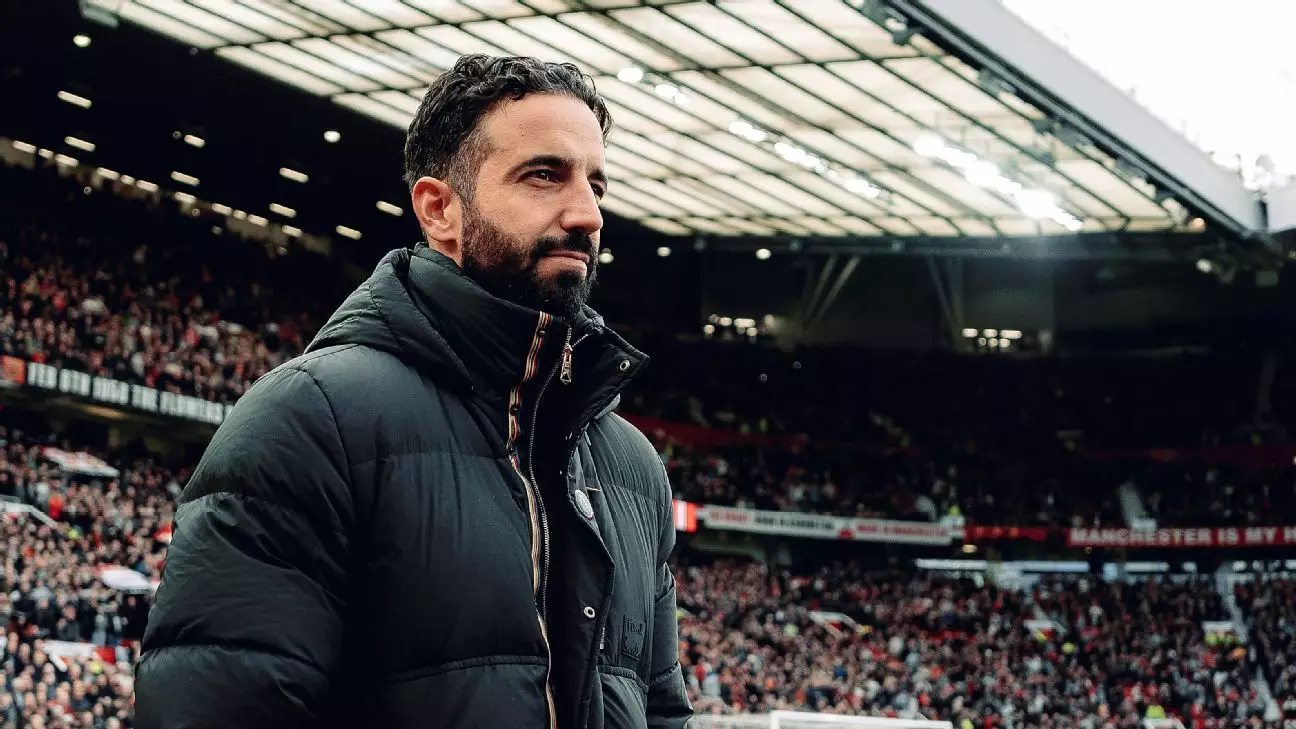As Ruben Amorim stepped into his new role as the head coach of Manchester United, the warm November sun that greeted him contrasted sharply with the turbulent days that followed. His arrival marked a significant moment for a club yearning for regeneration and stability after the tumultuous tenures of previous coaches. However, Amorim’s initial euphoria quickly gave way to the stark realities of managing one of football’s most storied franchises.
Upon his first examination of Carrington, the primary training ground of Manchester United, Amorim seemed energizingly optimistic. The initial enthusiasm set against the backdrop of unseasonable weather soon turned into a metaphor for his early tenure—a brief glimpse of brightness overshadowed by impending clouds. Just weeks into his role, he faced a slew of challenges that echoed beyond the football pitch. These included the abrupt departure of influential figures within the club’s hierarchy, including sporting director Dan Ashworth, and mounting pressure from external controversies, such as the Premier League’s LGBTQ+ initiatives and price hikes for match tickets.
As Amorim acknowledged in his early briefings, the essence of man management was paramount. It wasn’t merely about implementing tactics and formations; it was about reshaping team dynamics in an environment rife with discontent. His brief initial success—culminating in a 4-0 victory against Everton—appeared to mask deeper issues that this underperforming team faced.
Within his initial five matches, Amorim recorded a mixed bag of results—two wins, two losses, and a draw—which did little to bolster confidence among players or fans. The harsh reality was that he inherited a squad beset with low morale and performance anxiety. Navigating through these treacherous waters, Amorim’s tactical approach incorporated extensive team training sessions. He preferred to engage players collectively, often bypassing the typical one-on-one meetings, which could isolate players during a period when unity was indispensable.
Amorim’s innovative method of conducting tactical walkthroughs on the training pitch was a refreshing departure from the traditional drill structure. By situating the core of player development within a team-centric framework, he aimed to foster interdependence and camaraderie. This approach was particularly evident when he supported the team’s decision to forego wearing LGBTQ+ jackets, emphasizing solidarity even amid divisive discussions.
One striking aspect of Amorim’s management style is his commitment to authentic communication. New leaders often grapple with establishing strong connections with their players, yet Amorim’s youthful energy—along with fluency in English, Portuguese, and Spanish—positions him advantageously. By learning about players’ personal lives and opening dialogue on their terms, he builds trust, a pivotal element for any leader striving to regain team cohesion.
However, this charisma doesn’t cloud his ambition or authority. Amorim has introduced stringent protocols, including banning food on matchdays, as part of instilling discipline. These decisions reflect his priority of transforming the club’s culture while ensuring high performance amid a demanding schedule of fixtures. The cautionary tales of previous managers like Erik ten Hag and Ole Gunnar Solskjaer loom large in his strategy, reminding Amorim of the risks associated with player endurance and mental fatigue.
Despite having experienced success at Sporting CP, Amorim openly admitted he was grappling with the daunting scale of Manchester United. The pressure is relentless; the eyes of the world are firmly directed at each move he makes, each decision criticized and dissected. Engaging with media responsibilities thrice as frequently, he maintains a buoyant demeanor even when addressing incisive queries regarding team performance. Therein lies his greatest potential asset: the ability to frame adversity as an opportunity for growth.
The abrupt transition into a role at such a prestigious club necessitates adaptability. An often grueling fixture list in December further compounds Amorim’s task, as he must judiciously manage player fatigue while maintaining competitiveness. This balancing act requires not only tactical insight but also a strong reliance on data to assess player readiness.
With his family set to relocate to Manchester, Amorim’s personal life intertwines with his professional ambitions. His acknowledgment of prioritizing work during the festive season, coupled with a hopeful eye on family support, suggests a tactical mindset not just for the team, but for himself. This intricate dance of personal and professional cohesion might be what Amorim needs to weather the impending storms.
As Amorim continues to navigate the multifaceted challenges of coaching Manchester United, his focus will undoubtedly be on instilling a culture rooted in belief, respect, and shared objectives. The initial month has illuminated the steep ascent he faces, but with each challenge lies the potential for critical growth—both for him as a leader and for Manchester United as a club. Only time will tell whether his vision for revival can withstand the rigors of the Premier League and restore faith within one of football’s most storied institutions.

